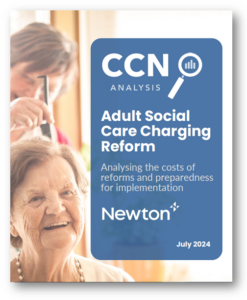T: 01822 851370 E: [email protected]
Councils Call for Delay to Unfunded Cap on Care, Warning of £30bn Funding Shortfall

 England’s largest councils are urging the government to delay the introduction of the cap on adult social care costs, warning that the reforms are impossible to implement by October 2025 due to a staggering £30 billion funding shortfall. The County Councils Network (CCN) has released a report, in collaboration with Newton, detailing the severe financial and operational challenges that local authorities face.
England’s largest councils are urging the government to delay the introduction of the cap on adult social care costs, warning that the reforms are impossible to implement by October 2025 due to a staggering £30 billion funding shortfall. The County Councils Network (CCN) has released a report, in collaboration with Newton, detailing the severe financial and operational challenges that local authorities face.
The new analysis by Newton reveals that the cost of the care cap and a more generous means-test has increased by a third, now totalling £30 billion over the next decade. Councils argue that this financial burden is unfunded, making the planned reforms unfeasible without significant additional resources from the government.
Summary of Key Findings:
- Due to a combination of inflation and demand the updated analysis by Newton shows that the minimum total cost of the reforms over the nine-year period analysed now stands at £30bn. The costs of the flagship element – the cap on care and extended means test - has risen 34%, from £13.9bn to £18.6bn.
- Councils in county and rural areas are most exposed to these costs, with 63% of the entire costs of the means-test and cap within these areas. Regionally, councils in the South East, South West and East of England combined account for 61% of the total minimum cumulative cost of these elements.
- With no money currently allocated to the reforms, funding was councils’ biggest concern about implementing the reforms. All bar one (97%) of councils said they were ‘very concerned’ about a shortfall in funding. In addition, eight in ten said they were very concerned about implementing the changes in the current timescales, whilst six in ten said they were very concerned about recruiting the numbers of staff to carry out extra assessments.
- Because of these funding, staffing, and timescale concerns, nine in ten (86%) of councils said they were not well prepared for the reforms with nine in ten (92%) supporting a delay of at least a year or more. Since the delay in 2022, and with uncertainty on the future of reforms after the election, preparations have been totally paused nationally and locally, while the analysis shows over 5,000 additional staff would need to be recruited.
- Every council said adequate funding was necessary to make the reforms workable. Nine in ten also said the current system must be sustainable before introducing reform.
- The £1.7bn in funding re-prioritised from the reforms in late 2022 has kept the show on the road for day-to-day adult social care services. Nine in ten (86%) councils spent the money offsetting inflationary costs, whilst half (54%) used it to commission more care packages and recruit more social workers.
- If the government was to instead use this funding for reform, there could be significant consequences. Without this funding, eight in ten (80%) of councils said it was likely they would not fulfil their statutory duties in adult social care, and six in ten (57%) said they would have to consider issuing a S114 Notice.
- Keeping services at a level as they are now and investing in workforce capacity is the top priority for councils over the next Parliament. All bar one council (97%) said ensuring there is enough funding to deliver the same amount of care services at present was their top priority, followed by workforce recruitment and retention (94%). Just a quarter (24%) said introducing the charging reforms were a high priority, with less than one in ten (9%) believing the introduction of a ‘national care service’ should be a priority.
 |
Cllr Martin Tett, Adult Social Care Spokesperson for the County Councils Network, stated:
|
Download the full report HERE.
 |
Kerry Booth, Chief Executive, Rural Services Network:
|



